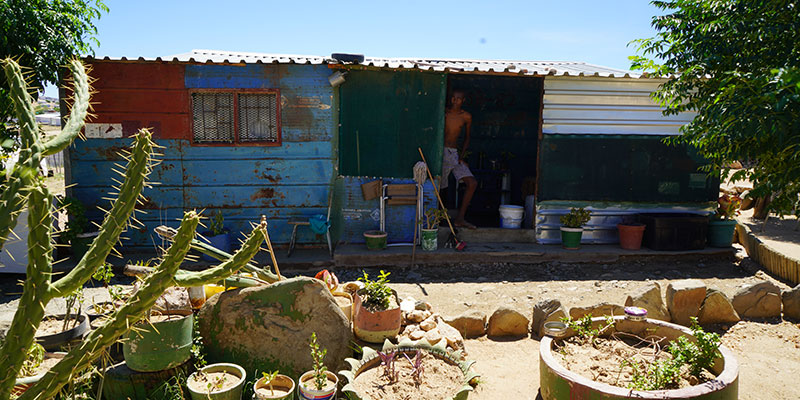Measuring the impact of covid on African settlements
-
Case study
- Environmental Sustainability and Resilience
- Justice and Equality
- Risk, Evidence and Decision Making
Posted on 30 July 2020
York researchers are helping African informal settlements evaluate their response to covid-19.

The COVID-19 pandemic is exposing the interdependence and vulnerability of our world.
The issue
The African continent is still predominantly rural, but it has some of the fastest-growing urban regions in the world. As a result, in Sub-Saharan Africa, 72 per cent of the population now live in informal settlements known as ‘peri-urban’ areas where populations, often from rural areas, settle.
African informal settlements have been badly affected by the coronavirus (COVID-19) pandemic due to the close proximity of residents, lack of formal infrastructure, poor healthcare provision, and fragile community economic resources.
Residents are facing high infection rates, food shortages, loss of income and families are missing out on access to digital services such as online e-learning for school children.
The pandemic is also putting a strain on local government organisations which often do not have the resources to develop suitable infrastructure or health care for these informal settlements. Central government responses are also varied – a situation that increases the perception of risk and reduces the likelihood of investment in relief efforts from philanthropic organisations.
The research
Through the Peri-Urban Resilient Ecosystem (PURE) project, York researchers are helping residents, community-based organisations, shack dweller federations, and government bodies evaluate the current situation and improve their preparations for future disease outbreaks.
The team is currently helping to administer a survey of 4,500 households across Kenya, Tanzania, and Namibia to gather residents’ views on the way the coronavirus outbreak has been handled, their perception of risk, the impact the pandemic has had on their livelihoods and how they have tackled the virus at an individual level.
Dr Steve Cinderby, Principal Investigator for the PURE project, explains: “PURE’s work is giving immediate benefit on-the-ground in terms of providing better local information to help guide the COVID-19 response in the informal settlements.
“It provides us with an extraordinary opportunity to feed this learning into debates on how to build-back-better – helping build resilience to multiple future environmental threats – hopefully reducing their impact particularly on the vulnerable urban poor.”
After the survey has been completed in late July, the researchers will work with community-based organisations and government bodies to design suitable pandemic preparedness, response, and recovery plans.
Find out more about the PURE project at the Stockholm Environment Institute.

Steve Cinderby
Dr Cinderby is a Senior Researcher focused on community resilience, urbanisation issues (including green infrastructure and mobility) and their links to wellbeing.

Rob Marchant
Professor Marchant’s research focuses on vegetation dynamics, ecosystem change and human-environment interactions.

Jessica Thorn
Dr Thorn researches the impacts mega-infrastructure on land-use change, and the synergies and trade-offs of ecological infrastructure for climate adaptation in peri-urban areas.

Adam Hejnowicz
Dr Hejnowicz is a visiting interdisciplinary social-ecological scientist interested in the connections and interactions between human, social and ecological systems.
Additional researchers
- Professor John Mfune, Department of Biological Sciences; University of Namibia (Namibia)
- Professor Sheona Shackleton, African Climate and Development Initiative, University of Cape Town (South Africa)
- Dr Anna Muller, Namibia Housing Action Group and Shack dwellers Federation of Namibia (SDFN-NHAG) (Namibia)
- Dr Guillermo Delgado, Department of Spatial Planning and Architecture Namibian University of Science and Technology (Namibia)
- Dr Royal Mabakeng, Department of Spatial Planning and Architecture Namibian University of Science and Technology (Namibia)
- Dr Catherine Masao, Institute of Resource Assessment, University of Dar es Salaam (Tanzania)
- Dr Emma Liwenga, Institute of Resource Assessment, University of Dar es Salaam (Tanzania)
- Professor Eleuther Mwangeni, School of Spatial Planing and Social Sciences, Ardhi University (Tanzania)
- Dr Nicholaus Mwangeni, Centre for Disaster Risk Management, Ardhi University (Tanzania)
- Jessica Kavonic, ICLEI Africa (South Africa)
- Dr Olayinka Ajala, Department of Politics, University of York (UK)
- Dr Richard Gunton, University of Winchester (UK)
- Edwin Othiambo, Mathare Safety Team CBO (Kenya)
- Vanilly Simataa Mbeha, Namibia Housing Action Group (Namibia)
